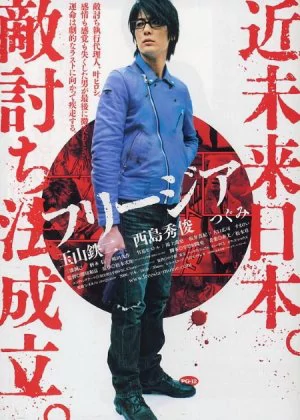Freesia: Icy Tears
Movie details

Kazuyoshi Kumakiri may just be one of the most underrated directors in contemporary Japanese cinema, so it's not a big surprise that Freesia: Icy Tears [Furîjia] faded rather quickly after its original release, never to be talked about again. Even I have to admit that my memories of the film were quite sketchy. I did remember it to be dark and different, a manga adaptation that never quite felt like one, which is why I was pretty excited to give it another go. While it's not difficult to understand why this film struggled to find an audience, it's certainly not because the quality wasn't there.
![screen capture of Freesia: Icy Tears [Furîjia]](/thumbs/img/articles/1200xauto/freesia-1.webp)
Freesia is a manga adaptation, which is glaringly obvious when taking a closer look at the plot. I haven't read the manga myself, so I can't say how much of the haziness is present in the source material. Just know that Kumakiri will make you work to understand what's going on. The film has some pretty specific lore and very little exposition. Instead, the audience is dropped in the middle of the story, and is left to figure out for itself how all the parts fit together. That makes this a rather inaccessible film for both arthouse, genre and mainstream audiences. Then again, catering to template audiences makes for boring cinema.
Though Kumakiri doesn't have a true signature style, his love for dark drama and scarred characters is something he carries over in most of his films, regardless of what genre he is working in. Freesia is no exception. Though dark and brooding characters are a manga/anime staple, Kumakiri doesn't exploit them for maximum sentiment or heroism. Instead, he goes for a more nihilistic and unsympathetic angle, which further dampens the accessibility of the film. It's nothing fans of Japanese cinema haven't seen before, but it goes a long way to explain why a film like this never made it big.
In an unspecified and alternative future, Japan is still at war. More interestingly, the government carries out legal executions, though not without giving the accused a fighting chance. They are allowed a bodyguard of their choice, who will protect them against the members of a special bureau enlisted to carry out the executions. One of the bureau's employees is a mysterious young man, a killer who shows no emotions and appears oblivious to pain. He is the result of an experiment that was carried out on him when he was still a young boy.
![screen capture of Freesia: Icy Tears [Furîjia]](/thumbs/img/articles/1200xauto/freesia-2.webp)
In line with the themes and mood, Kumakiri stays away from bright and vibrant colors. Most of the film is doused in a desaturated sepia mist, with just a pop of color left and right to accentuate certain details. The camera work is on point, the film becomes pretty graphic when needed and though the visual effects look pretty cheap by modern standards, Kumakiri does a good job of keeping them slightly out of focus. It's certainly not the best-looking Japanese film around, but it looks very competent, with a distinct enough style to set it apart from other films.
The soundtrack is atmospheric, but not quite as outspoken as I would've hoped. It would've been an ideal way to give the film an extra push and make it stand out even more, instead, it seems more geared at supporting the atmosphere and making sure the audience finds a little extra guidance through the soundtrack. Kumakiri jumps between genres with ease (some pieces sound more jazzy, there are some ambient tracks, and even some classic piano-based themes for the more dramatic scenes). It's coherent and effective, but it's not quite as memorable.
Performances are pretty great, certainly taking the source material into consideration. You might expect more dynamic (read borderline overstated) performances from the cast, especially from a manga adaptation, but apart from a few notable exceptions, the cast takes a more muted approach to the characters. It makes them a little harder to read, but it adds a level of dramatic depth rarely seen in this type of film. Tetsuji Tamayama and Hidetoshi Nishijama are the obvious stand-outs, but it would be unfair to the rest of the cast to single them out too much.
![screen capture of Freesia: Icy Tears [Furîjia]](/thumbs/img/articles/1200xauto/freesia-3.webp)
It takes a while to get as solid grip on the setting and the characters, as the film is rather stingy with its explanation of the lore. It's not too complex though and if you pay attention it shouldn't take you too long to find your way. The drama slowly builds up towards a logical conclusion, with some action scenes thrown in to make sure the film never becomes too dry or static. Nothing too out of the ordinary or unique, except that it is a rather novel structure for this type of (somewhat cheesy) genre fare. Kumakiri pulls it off effortlessly, but it's certainly a divisive approach that isn't going to sit well with part of the audience.
One thing that is certain when watching a Kumakiri film: it is bound to be interesting. Whether you end up loving, liking or hating this film depends a lot on what you expect to see from a manga adaptation, but the balance of genre and drama is quite particular and not something you'll easily find somewhere else. The atmospheric cinematography, the strong performances and the intriguing lore make this a fun yet challenging manga adaptation that captivates from start to finish. It places Freesia in a category of its own, which is reason enough to give this film a fair shot. If you can still get a hold of it that is.